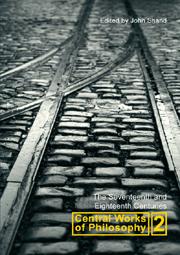Book contents
- Frontmatter
- Contents
- Contributors
- Preface
- Seventeenth- and Eighteenth-Century Philosophy: Introduction
- 1 René Descartes: Meditations on First Philosophy
- 2 Baruch Spinoza: Ethics
- 3 G. W. Leibniz: Monadology
- 4 Thomas Hobbes: Leviathan
- 5 John Locke: An Essay concerning Human Understanding
- 6 George Berkeley: A Treatise Concerning the Principles of Human Knowledge
- 7 David Hume: A Treatise of Human Nature
- 8 Jean-Jacques Rousseau: The Social Contract
- Index
8 - Jean-Jacques Rousseau: The Social Contract
- Frontmatter
- Contents
- Contributors
- Preface
- Seventeenth- and Eighteenth-Century Philosophy: Introduction
- 1 René Descartes: Meditations on First Philosophy
- 2 Baruch Spinoza: Ethics
- 3 G. W. Leibniz: Monadology
- 4 Thomas Hobbes: Leviathan
- 5 John Locke: An Essay concerning Human Understanding
- 6 George Berkeley: A Treatise Concerning the Principles of Human Knowledge
- 7 David Hume: A Treatise of Human Nature
- 8 Jean-Jacques Rousseau: The Social Contract
- Index
Summary
Introduction
Perhaps the most quoted line of Jean-Jacques Rousseau's The Social Contract begins its first chapter: “Man is born free, and everywhere he is in chains” (SC i.1 [1]; Rousseau 1997b: 41). Man is naturally free in the sense that he is born without any genuine obligations to others to refrain from doing whatever he judges is necessary for his self-preservation, once he acquires the capacities for judgement. Yet everywhere he is subjected to positive laws administered by some government whose leaders claim to be his rightful masters.
The author of that provocative line, which echoes similar statements by the great seventeenth-century English social contract theorists Hobbes and Locke, was born in Geneva in 1712 to parents who were native citizens of the small republic. His mother died within days of his birth, and his watchmaker father left Geneva in 1722, forcing Jean-Jacques to find work as an apprentice to a notary and then an engraver. He wandered away in 1728 and found shelter with Mme de Warens at Annecy in Savoy. Aside from a brief stint in Turin, where he converted from Calvinism to Roman Catholicism (although he reconverted to Calvinism in 1754), he spent the next dozen years living with her, educating himself at her salon and becoming her lover as of 1733. In 1740, he moved to Lyon to tutor the children of M. de Mably and became acquainted with Mably's elder brother, Etienne Bonnot (later the Abbe de Condillac), whom Patrick Riley calls “with Voltaire the greatest ‘Lockean’ in post-Regency France” (2001: 3). In 1742, Rousseau moved to Paris.
- Type
- Chapter
- Information
- Central Works of Philosophy , pp. 193 - 222Publisher: Acumen PublishingPrint publication year: 2005



